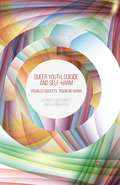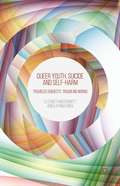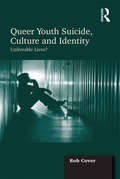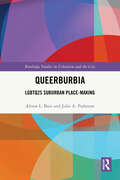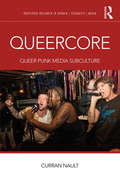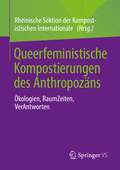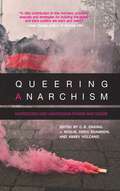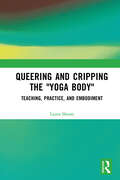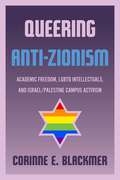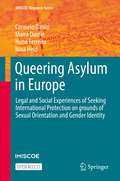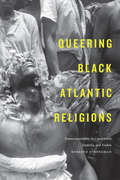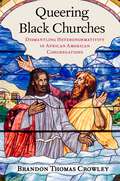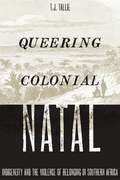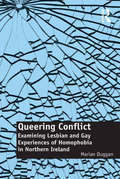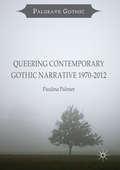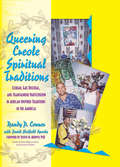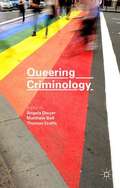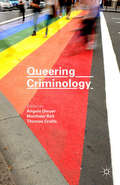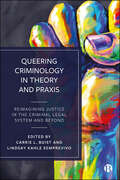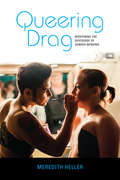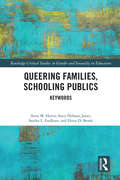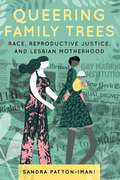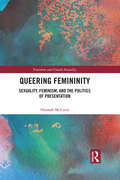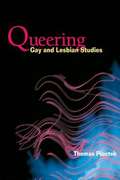- Table View
- List View
Queer Youth, Suicide and Self-Harm: Troubled Subjects, Troubling Norms
by E. McDermott K. RoenOffering a new way of understanding the high self-harm and suicide rates among sexual and gender minority youth, this book prioritises the perspectives and experiences of queer young people, including those who have experience of self-harming and/or feeling suicidal. Presenting analysis based on research carried out with young people both online and face-to-face, the authors offer a critical perspective on the role of norms, namely developmental norms, gender and sexuality norms, and neoliberal norms, in the production of self-harming and suicidal youth. Queer Youth, Suicide and Self-Harm is unique in the way it works at the intersection of class and sexuality, and in its specific focus on transgender youth and the concept of embodied distress. It also examines the implications of this research for self-harm reduction and suicide prevention.
Queer Youth, Suicide and Self-Harm: Troubled Subjects, Troubling Norms
by Elizabeth McDermott Katrina RoenOffering a new way of understanding the high self-harm and suicide rates among sexual and gender minority youth, this book prioritises the perspectives and experiences of queer young people, including those who have experience of self-harming and/or feeling suicidal. Presenting analysis based on research carried out with young people both online and face-to-face, the authors offer a critical perspective on the role of norms, namely developmental norms, gender and sexuality norms, and neoliberal norms, in the production of self-harming and suicidal youth. Queer Youth, Suicide and Self-Harm is unique in the way it works at the intersection of class and sexuality, and in its specific focus on transgender youth and the concept of embodied distress. It also examines the implications of this research for self-harm reduction and suicide prevention.
Queer Youth Suicide, Culture and Identity: Unliveable Lives?
by Rob CoverDespite increasing tolerance, legal protections against homophobia, and anti-discrimination policies throughout much of the western world, suicide attempts by queer youth remain relatively high. For over twenty years, research into queer youth suicide has debated reasons and risks, although it has also often reiterated assumptions about sexual identity and youth vulnerability. Understanding the cultural context in which suicide becomes a necessary escape from living an unliveable life is the key to queer youth suicide prevention. This book uses cultural theory to outline some of the ways in which queer youth suicide is perceived in popular culture, media and research. It highlights how the ways in which we think about queer youth suicide have changed over time and some of the benefits and limitations of current thinking on the topic. Focusing on identity, Queer Youth Suicide, Culture and Identity also investigates why queer young men continue to attempt suicide. Drawing on approaches from queer theory, cultural studies and sociology, it explores how sexual identity formation, sexual shame and discrepancies in community belonging and exclusions are implicated in the reasons why some queer youth are resilient while others are vulnerable and at risk of suicide. As such, it will appeal to scholars of sociology, media studies, queer theory and social theory with interests in youth, gender and sexuality, and suicidology.
Queerburbia: LGBTQ2S Suburban Place-Making (Routledge Studies in Urbanism and the City)
by Alison L. Bain Julie A. PodmoreTo subvert the metronormativity of queer urban studies and re-place queer suburbanism, Queerburbia examines LGBTQ2S place-making/unmaking/remaking on the peripheries of Canada’s three largest city-regions (Vancouver, Toronto, and Montreal), investigating print media and census representations, civic and para-public allyship, individual and collective activism, and everyday practices of living and dreaming as revealed through photo-elicitation interviews and collective counter-mapping that together unmake and remake suburban places as queer.Queerburbia offers a comparative case study of how large Canadian city-regions become queerer through LGBTQ2S suburban place-making/unmaking/remaking. For urban scholars, it deepens place-making theory with the conceptual introduction of the neologism “queerburbia” as a means to re-envision metropolitan peripheries as sites of queer futures. Practically, it offers civic leaders, urban planners, and policymakers insights into the complex dynamics of municipal LGBTQ2S misrecognition and critical allyship strategies beyond rainbowization. Methodologically innovative, this book combines print media, census, and municipal policy analysis with expert and photo-elicitation interviews, counter-mapping focus groups, and ethnographic fieldwork. It reveals the multiple layers of queerburban place-making/unmaking/remaking, demonstrating how statistical and media representations, municipal services and social inclusion policies, para-public and activist resistance and organizing, and individual living and dreaming emplace sexual and gender minorities in suburbia. An interdisciplinary book at the interstices of Geography, Urban Studies, Suburban Studies, Urban Planning, and LGBTQ+ Studies, its intended audiences are scholars of cities, queer theory, and sexual and gender minority life extending to Women’s and Gender Studies, Cultural Studies, Sociology, Anthropology, and Psychology. It targets upper-level undergraduates, graduate students, researchers and practitioners of municipal social inclusion, including civic leaders, urban policymakers, and urban planners.
Queercore: Queer Punk Media Subculture (Routledge Research in Gender, Sexuality, and Media)
by Curran NaultQueercore is a queer and punk transmedia movement that was instigated in 1980s Toronto via the pages of the underground fanzine ("zine") J.D.s. Authored by G.B. Jones and Bruce LaBruce, J.D.s. declared "civil war" on the punk and gay and lesbian mainstreams, consolidating a subculture of likeminded filmmakers, zinesters, musicans and performers situated in pointed opposition to the homophobia of mainline punk and the lifeless sexual politics and exclusionary tendencies of dominant gay and lesbian society. More than thirty years later, queercore and its troublemaking productions remain under the radar, but still culturally and politically resonant.This book brings renewed attention to queercore, exploring the homology between queer theory/practice and punk theory/practice at the heart of queercore mediamaking. Through analysis of key queercore texts, this book also elucidates the tropes central to queercore’s subcultural distinction: unashamed sexual representation, confrontational politics and "shocking" embodiments, including those related to size, ability and gender variance. An exploration of a specific transmedia subculture grounded in archival research, ethnographic interviews, theoretical argumentation and close analysis, ultimately, Queercore proffers a provocative, and tangible, new answer to the long-debated question, "What does it mean to be queer?"
Queerfeministische Kompostierungen des Anthropozäns: Ökologien, RaumZeiten, VerAntworten
by Rheinische Sektion der Kompostistischen InternationaleKompost ist zugleich eine Ontologie und eine Art und Weise des Wissens, der Wissensproduktion, die gemeinsam das vermeintlich Gegebene ‚der Welt‘ auseinanderdröseln, um daraus vielzählige Welten hervorzubringen. Alles ist und bedeutet gleichzeitig, ereignet, affiziert, transformiert sich: Wissen kompostiert Welt kompostiert Wissen. Kompost unterläuft Trennungen von Ästhetik, Ethik, Epistemologie und Ontologie, wie sie für das westliche Denken charakteristisch sind. Ausschließung, Einschließung, Gewalt, race, class, gender müssen kompostiert werden, müssen ver/antwortet, gehalten, anders gedacht und anders erzählt, Privilegien zersetzt und verlernt werden. Hierbei nehmen radikal nichtbinäre, pluriversale, relationale, queerfeministische Ökologien onto-epistemologische Gestalt an, die Relationalitäten, Responseabilities und Sorge sowie RaumZeiten und Materien/Materialisierungen verschränkt mit-denken, gerade ohne über sie zu verfügen.
Queering Anarchism
by Deric Shannon Abbey Volcano J. Rogue Martha Ackelsberg C. B. Daring"A much-needed collection that thinks through power, desire, and human liberation. These pieces are sure to raise the level of debate about sexuality, gender, and the ways that they tie in with struggles against our ruling institutions."?Roxanne Dunbar-Ortiz, Outlaw Woman"Against the austerity of straight politics, Queering Anarchism sketches the connections between gender mutiny, queer sexualities, and anti-authoritarian desires. Through embodied histories and incendiary critique, the contributors gathered here show how we must not stop at smashing the state; rather normativity itself is the enemy of all radical possibility."-Eric A. Stanley, co-editor of Captive GendersWhat does it mean to "queer" the world around us? How does the radical refusal of the mainstream codification of GLBT identity as a new gender norm come into focus in the context of anarchist theory and practice? How do our notions of orientation inform our politics?and vice versa? Queering Anarchism brings together a diverse set of writings ranging from the deeply theoretical to the playfully personal that explore the possibilities of the concept of "queering," turning the dominant, and largely heteronormative, structures of belief and identity entirely inside out. Ranging in topic from the economy to disability, politics, social structures, sexual practice, interpersonal relationships, and beyond, the authors here suggest that queering might be more than a set of personal preferences?pointing toward the possibility of an entirely new way of viewing the world.Contributors include Jamie Heckert, Sandra Jeppesen, Ben Shepard, Ryan Conrad, Jerimarie Liesegang, Jason Lydon, Susan Song, Stephanie Grohmann, Liat Ben-Moshe, Anthony J. Nocella, A.J. Withers, and more.Deric Shannon, C.B. Daring, J. Rogue, and Abbey Volcano are anarchists and activists who work in a wide variety of radical, feminist, and queer communities across the United States.
Queering and Cripping the “Yoga Body”: Teaching, Practice, and Embodiment
by Laura ShearsQueering and Cripping the “Yoga Body” deconstructs the power relations and dominant discourses that shape the image of a healthy, natural, gendered body performing a postural yoga practice.This book examines empirical yoga research, yoga-related media, and yoga teacher training materials to critique how yoga becomes a manageable, predictable intervention that individuals can and should undertake in order to create healthy, manageable, non-burdensome bodies. It argues that when yoga is positioned as a natural intervention, discourses of morality and purity become intertwined with those of measurability, responsibility, control, health, and gender. It also considers the author’s own embodied experience, as well as those of other queer and disabled yoga teachers and practitioners, and how such experiences can open up possibilities for the teaching and practice of yoga.Queering and Cripping the “Yoga Body” will be of interest to graduate students and researchers studying embodiment, health and mindfulness practices, poststructuralism, queer theory, or disability studies, as well as researchers, teachers, and practitioners of yoga.
Queering Anti-Zionism: Academic Freedom, LGBTQ Intellectuals, and Israel/Palestine Campus Activism
by Corinne E. BlackmerWith engaged scholarship and an exciting contribution to the field of Israel/Palestine studies, queer scholar-activist Corinne Blackmer stages a pointed critique of scholars whose anti-Israel bias pervades their activism as well as their academic work. Blackmer demonstrates how the Boycott, Divestment, and Sanctions (BDS) movement that seeks to delegitimize and isolate Israel has become a central part of social justice advocacy on campus, particularly within gender and sexuality studies programs. The chapters focus on the intellectual work of Sarah Schulman, Jasbir Puar, Angela Davis, Dean Spade, and Judith Butler, demonstrating how they misapply critical theory in their discussions of the State of Israel. Blackmer shows how these LGBTQ intellectuals mobilize queer theory and intersectionality to support the BDS movement at the expense of academic freedom and open discourse.
Queering Asylum in Europe: Legal and Social Experiences of Seeking International Protection on grounds of Sexual Orientation and Gender Identity (IMISCOE Research Series)
by Nuno Ferreira Moira Dustin Carmelo Danisi Nina HeldThis two-volume open-access book offers a theoretically and empirically-grounded portrayal of the experiences of people claiming international protection in Europe on the basis of their sexual orientation or gender identity (SOGI). It shows how European asylum systems might and should treat asylum claims based on people’s SOGI in a fairer, more humane way. Through a combined comparative, interdisciplinary (socio-legal), human rights, feminist, queer and intersectional approach, this book examines not only the legal experiences of people claiming asylum on grounds of their SOGI, but also their social experiences outside the asylum decision-making framework. The authors analyse how SOGI-related claims are adjudicated in different European frameworks (European Union, Council of Europe, Germany, Italy and UK) and offer detailed recommendations to adequately address the intersectional experiences of individuals seeking asylum. This unique approach ensures that the book is of interest not only to researchers in migration and refugee studies, law and wider academic communities, but also to policy makers and practitioners in the field of SOGI asylum.
Queering Bathrooms
by Sheila L. CavanaghThe intersection of public washrooms and gender has become increasingly politicized in recent years: queer and trans folk have been harassed for allegedly using the 'wrong' washroom, while widespread campaigns have advocated for more gender-neutral facilities. In Queering Bathrooms, Sheila L. Cavanagh explores how public toilets demarcate the masculine and the feminine and condition ideas of gender and sexuality.Based on 100 interviews with GLBT and/or intersex peoples in major North American cities, Cavanagh delves into the ways that queer and trans communities challenge the rigid gendering and heteronormative composition of public washrooms. Incorporating theories from queer studies, trans studies, psychoanalysis, and the work of Michel Foucault, Cavanagh argues that the cultural politics of excretion is intimately related to the regulation of gender and sexuality. Public toilets house the illicit and act as repositories for the social unconscious. Also offering suggestions for imagining a more inclusive public washroom, Queering Bathrooms asserts that although toilets are not typically considered within traditional scholarly bounds, they form a crucial part of our modern understanding of sex and gender.
Queering Black Atlantic Religions: Transcorporeality in Candomblé, Santería, and Vodou (Religious Cultures of African and African Diaspora People)
by Roberto StrongmanIn Queering Black Atlantic Religions Roberto Strongman examines Haitian Vodou, Cuban Lucumí/Santería, and Brazilian Candomblé to demonstrate how religious rituals of trance possession allow humans to understand themselves as embodiments of the divine. In these rituals, the commingling of humans and the divine produces gender identities that are independent of biological sex. As opposed to the Cartesian view of the spirit as locked within the body, the body in Afro-diasporic religions is an open receptacle. Showing how trance possession is a primary aspect of almost all Afro-diasporic cultural production, Strongman articulates transcorporeality as a black, trans-Atlantic understanding of the human psyche, soul, and gender as multiple, removable, and external to the body.
Queering Black Churches: Dismantling Heteronormativity in African American Congregations
by Brandon Thomas CrowleyQueering Black Churches provides a systematic approach for dismantling heteronormativity within African American congregations. Using the lenses of practical theology, ecclesiology, Queer theology, and gender studies, Brandon Thomas Crowley examines the heteronormative histories, theologies, morals, values, and structures of Black churches and how their longstanding assumptions can be challenged. <P><P>Drawing on the experiences of several historically Black churches that became open and affirming (ONA), Queering Black Churches explores how historically Black churches have queered their congregations. Crowley examines the similarities and differences in their approaches and synthesizes them into a methodology called Black ecclesial Queering: a theoretical analysis and a practical method of queering that centers on the lived experiences of Black Queer folks seeking to subvert the puritanical ideologies of Black churches. Crowley argues for a systematic approach to dismantling homophobia within African American congregations that moves beyond surface-level allyship toward actual structural renovation. With its groundbreaking documentation of ONA congregations and its practical proposals for change, this book will be a valuable resource for students, scholars, and clergy alike.
Queering Colonial Natal: Indigeneity and the Violence of Belonging in Southern Africa
by T. J. TallieHow were indigenous social practices deemed queer and aberrant by colonial forces? In Queering Colonial Natal, T.J. Tallie travels to colonial Natalestablished by the British in 1843, today South Africa&’s KwaZulu-Natal provinceto show how settler regimes &“queered&” indigenous practices. Defining them as threats to the normative order they sought to impose, they did so by delimiting Zulu polygamy; restricting alcohol access, clothing, and even friendship; and assigning only Europeans to government schools. Using queer and critical indigenous theory, this book critically assesses Natal (where settlers were to remain a minority) in the context of the global settler colonial project in the nineteenth century to yield a new and engaging synthesis. Tallie explores the settler colonial history of Natal&’s white settlers and how they sought to establish laws and rules for both whites and Africans based on European mores of sexuality and gender. At the same time, colonial archives reveal that many African and Indian people challenged such civilizational claims. Ultimately Tallie argues that the violent collisions between Africans, Indians, and Europeans in Natal shaped the conceptions of race and gender that bolstered each group&’s claim to authority.
Queering Conflict: Examining Lesbian and Gay Experiences of Homophobia in Northern Ireland
by Marian DugganQueering Conflict offers a unique culturally specific analysis into the ways in which homophobia in Northern Ireland has been informed and sustained during the latter half of the twentieth century. This book takes the failure of the British Government to extend the 1967 Sexual Offences Act to Northern Ireland as its central point to demonstrate the subtle, but important, differences governing attitudes towards homosexuality in Northern Ireland. Both homophobia and hate crimes are shown to be situated within the framework of Northern Ireland's socio-political history as well as part of an overall culture of violence which existed as a result of 'the Troubles'. Duggan shows how the influence of moral and religious conservatism born out of sectarian divisions led to homophobia becoming an integral part of community cohesion and identity formation. Decades of political instability led to the marginalization of rights for lesbians and gay men, but the peace process has led to the development of a discourse of equality which is slowly allowing sexual minorities to situate themselves within the new Northern Ireland.
Queering Contemporary Gothic Narrative 1970-2012
by Paulina PalmerThis book explores the development of queer Gothic fiction, contextualizing it with reference to representations of queer sexualities and genders in eighteenth and nineteenth-century Gothic, as well as the sexual-political perspectives generated by the 1970s lesbian and gay liberation movements and the development of queer theory in the 1990s. The book examines the roles that Gothic motifs and narrative strategies play in depicting aspects of lesbian, gay, bisexual, transsexual and intersex experience in contemporary Gothic fiction. Gothic motifs discussed include spectrality, the haunted house, the vampire, doppelganger and monster. Regional Gothic and the contribution that Gothic tropes make to queer historical fiction and historiography receive attention, as does the AIDS narrative. Female Gothic and feminist perspectives are also explored. Writers discussed include Peter Ackroyd, Vincent Brome, Jim Grimsley, Alan Hollinghurst, Randall Kenan, Meg Kingston, Michelle Paver, Susan Swan, Louise Tondeur, Sarah Waters, Kathleen Winter and Jeanette Winterson.
Queering Creole Spiritual Traditions: Lesbian, Gay, Bisexual, and Transgender Participation in African-Inspired Traditions in the Americas
by David Sparks Randy P Lundschien ConnerWhat roles do queer and transgender people play in the African diasporic religions? Queering Creole Spiritual Traditions: Lesbian, Gay, Bisexual, and Transgender Participation in African-Inspired Traditions in the Americas is a groundbreaking scholarly exploration of this long-neglected subject. It offers clear insight into the complex dynamics of gender and sexual orientation, humans and deities, and race and ethnicity, within these richly nuanced spiritual practices. Queering Creole Spiritual Traditions explores the ways in which gender complexity and same-sex intimacy are integral to the primary beliefs and practices of these faiths. It begins with a comprehensive overview of Vodou, Santeria, and other African-based religions. The second section includes extensive, revealing interviews with practitioners who offer insight into the intersection of their beliefs, their sexual orientation, and their gender identity. Finally, it provides a powerful analysis of the ways these traditions have inspired artists, musicians, and writers such as Audre Lorde, as well as informative interviews with the artists themselves. In Queering Creole Spiritual Traditions, you will discover: how the presence of androgynous divinities affects both faith and practice in Vodou, Candomble, Santeria, and other Creole religions how the phenomenon of possession or embodiment by a god or goddess may validate queer identity and nurture gender complexity who practices the African-derived spiritual traditions, what they believe, and who their deities are how these faiths have influenced the art and aesthetic traditions of the West This landmark book opens a fascinating new world of thought and belief. The authors provide rigorous documentation and faultless scholarly method as well as personal experience and the testimony of believers. Queering Creole Spiritual Traditions sheds new light on two widely different fields: LGBT studies and the theology of the African diaspora. A thorough bibliography points the way to further study, and an extensive photograph gallery provides a unique look at the believers and their practices. Every library with holdings in queer theory, African mythology, or sociology of religion should have this landmark volume.
Queering Criminology
by Thomas Crofts Matthew Ball Angela DwyerQueer criminological work is at the forefront of critical academic criminology, responding to the exclusion of queer communities from criminology, and the injustices that they experience through the criminal justice system. This volume draws together both theoretical and empirical contributions that develop the growing scholarship being produced at the intersection of 'queer' and 'criminology'. Reflecting the diversity of research that is undertaken at this intersection, the contributions to this volume offer a deeper theoretical and conceptual development of this field alongside empirical research that illustrates the continued relevance and urgency of such scholarship. The contributions consider what it means to be queering criminology in the current political, social, and criminological climate, and chart directions along which this field might develop in order to ensure that greater social and criminal justice for LGBTIQ communities is achieved.
Queering Criminology: Dangerous Bedfellows? (Critical Criminological Perspectives Ser.)
by Angela Dwyer Matthew Ball Thomas CroftsQueer criminological work is at the forefront of critical academic criminology, responding to the exclusion of queer communities from criminology, and the injustices that they experience through the criminal justice system. This volume draws together both theoretical and empirical contributions that develop the growing scholarship being produced at the intersection of 'queer' and 'criminology'. Reflecting the diversity of research that is undertaken at this intersection, the contributions to this volume offer a deeper theoretical and conceptual development of this field alongside empirical research that illustrates the continued relevance and urgency of such scholarship. The contributions consider what it means to be queering criminology in the current political, social, and criminological climate, and chart directions along which this field might develop in order to ensure that greater social and criminal justice for LGBTIQ communities is achieved.
Queering Criminology in Theory and Praxis: Reimagining Justice in the Criminal Legal System and Beyond
by Carrie L. Buist & Lindsay Kahle SemprevivoThis accessible book introduces the key concepts and theoretical developments of queer criminology and explains what they mean for modern criminal justice frameworks and practitioners. The book sets out experiences of the LGBTQ+ population as victims, offenders and professionals in legal systems in the US and internationally and explores what they mean for elements of those systems including police, courts, corrections and victims’ services. It is both a useful reference point for academics, students and professionals and a guide to how queer criminology can be theoretically applied and practically implemented in the worlds of policing, courts, corrections, and victims' services.
Queering Drag: Redefining the Discourse of Gender-Bending
by Meredith HellerTheatrical gender-bending, also called drag, is a popular form of entertainment and a subject of scholarly study. However, most drag studies do not question the standard words and ideas used to convey this performance genre. Drawing on a rich body of archival and ethnographic research, Meredith Heller illuminates diverse examples of theatrical gender-bending: male impersonation in variety and vaudeville (1860–1920); the "sexless" gender-bending of El Teatro Campesino (1960–1980); queer butch acts performed by black nightclub singers, such as Stormé DeLarverie, instigator of the Stonewall riots (1910–1970); and the range of acts that compose contemporary drag king shows. Heller highlights how, in each case, standard drag discourses do not sufficiently capture the complexity of performers' intents and methods, nor do they provide a strong enough foundation for holistically evaluating the impact of this work. Queering Drag offers redefinition of the genre centralized in the performer's construction and presentation of a "queer" version of hegemonic identity, and it models a new set of tools for analyzing drag as a process of intents and methods enacted to effect specific goals. This new drag discourse not only allows for more complete and accurate descriptions of drag acts, but it also facilitates more ethical discussions about the bodies, identities, and products of drag performers.
Queering Families, Schooling Publics: Keywords (Routledge Critical Studies in Gender and Sexuality in Education)
by Anne M. Harris Sandra L. Faulkner Stacy Holman Jones Eloise D. BrookAt a time of increasingly diverse and dynamic debates on the intersections of contemporary LGBTQ rights, trans* visibility, same-sex families, and sexualities education, there is surprisingly little writing on what it means to queer notions of family and kinship networks in global context. Building on the recent wave of scholarship on queerness in families and how families intersect with schools, schooling and educational institutions more broadly, this book considers how we are taught to enact family at home, at school and through the media, and how this pedagogy has shifted and changed over time. Conceived as a collection of keywords that take up the vocabulary of queerness, queering practices, and queer families, the authors employ a nuanced intersectional approach to connect the damaging and persistent invisibility of their subject to the complex and dominant and normalizing discourses of marriage and family. Offering post-structural, post-humanist, and new materialist perspectives on kinship and the family, this book moves the conversation forward by critically interrogating and expanding upon current knowledges about gender diversity, queer kinship, and pedagogy.
Queering Family Trees: Race, Reproductive Justice, and Lesbian Motherhood
by Sandra Patton-ImaniArgues that significant barriers to family-making exist for lesbian mothers of color in the United StatesOne might be tempted, in the afterglow of Obergefell v. Hodges, to believe that the battle has been won, that gays and lesbians fought a tough fight and finally achieved equality in the United States through access to legal marriage. But that narrative tells only one version of a very complex story about family and citizenship.Queering Family Trees explores the lived experience of queer mothers in the United States, drawing on over one hundred interviews with African American, Latina, Native American, white, and Asian American lesbian mothers living in a range of socioeconomic circumstances to show how they have navigated family-making. While the legalization of same-sex marriage and adoption in 2015 has provided avenues toward equality for some couples, structural and economic barriers have meant that others—especially queer women of color who often have fewer financial resources—have not been able to access seemingly available “choices” such as second-parent adoptions, powers of attorney, and wills. Sandra Patton-Imani here argues that the virtual exclusion of lesbians of color from public narratives about LGBTQ families is crucial to maintaining the narrative that legal marriage for same-sex couples provides access to full equality as citizens. Through the lens of reproductive justice, Patton-Imani argues that the federal legalization of same-sex marriage reinforces existing structures of inequality grounded in race, gender, sexuality, and class. Queering Family Trees explores the lives of a critically erased segment of the queer population, demonstrating that the seemingly “color blind” solutions offered by marriage equality do not rectify such inequalities.
Queering Femininity: Sexuality, Feminism and the Politics of Presentation (Feminism and Female Sexuality)
by Hannah McCannQueering Femininity focuses on femininity as a style of gender presentation and asks how (and whether) it can be refigured as a creative and queer style of the body. Drawing on a range of feminist texts and interviews with self-identifying queer femmes from the LGBTQ community, Hannah McCann argues that the tendency to evaluate femininity as only either oppressive or empowering limits our understanding of its possibilities. She considers the dynamic aspects of feminine embodiment that cannot simply be understood in terms of gender normativity and negotiates a path between understanding both the attachments people hold to particular gender identities and styles, and recognising the punitive realities of dominant gender norms and expectations. Topics covered range from second wave feminist critiques of beauty culture, to the importance of hair in queer femme presentation. This book offers students and researchers of Gender, Queer and Sexuality Studies a fresh new take on the often troubled relationship between feminism and femininity, a critical but generous reading that highlights the potential for an affirmative orientation that is not confined by the demands of identity politics.
Queering Gay and Lesbian Studies
by Thomas PiontekQueering Gay and Lesbian Studies is a broadly interdisciplinary study that considers a key dilemma in gay and lesbian studies through the prism of identity and its discontents: the field studies has modeled itself on ethnic studies programs, perhaps to be intelligible to the university community, but certainly because the ethnic studies route to programs is well established. Since this model requires a stable and identifiable community, gay and lesbian studies have emphasized stable and knowable identities. The problem, of course is that sexuality is neither stable, tidy, nor developmental. With the advent of queer theory, there are now other perspectives available that frequently find themselves at odds with traditional gay and lesbian studies. In this pioneering new study, Thomas Piontek provides a critical analysis of the development of gay and lesbian studies alongside the development of queer theory, the disputes between them, and criticism of their activities from both in and outside of the gay academic community. Examining disputes about transgendering, gay male promiscuity, popular culture, gay history, political activism, and non-normative sexual practices, Piontek argues that it is vital to queer gay and lesbian studies--opening this emerging discipline to queer critical interventions without, however, further institutionalizing queer theory.
